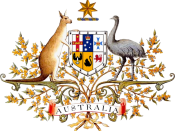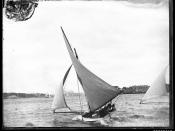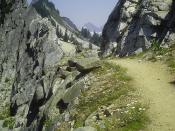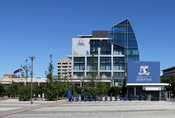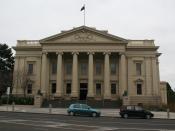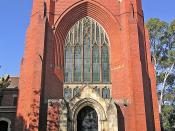In what ways would you characterise Dawe as an Australian poet? Illustrate your answer in some way detail with reference to three poems.
Bruce Dawe, a well renowned Australian poet was born in 1930 in Geelong, Victoria. He was an altogether indifferent pupil and left school at the age of sixteen working mostly as a labourer for the next ten years. However, he finished an adult matriculation course at night school and, in 1954, entered the University of Melbourne. He remained at Melbourne for only a year, but it was there that he met Philip Martin, whom Dawe acknowledges as the greatest influence in his literacy concerns, and who remained a friend, and an advisor in his developing poetic skills after he left his studies. After leaving University he was employed in Sydney as a factory hand, and in Melbourne as a postman. He then served in the RAAF from 1959-1968.
He was a teacher at Downlands College from 1969 to 1971, then at the University of Southern Queensland, retiring in 1993. He is married with four children. All of the above expericances have brought Dawe to write the poetry he has in "ÃÂSometimes Gladness."ÃÂ Bruce Dawe, who was once portrayed as "an ordinary man with a difference"ÃÂ writes about ordinary Australian people in the suburbs confronting their everyday problems. He observes and records the sorrow and hardships of average people struggling back in the 1940's, right through until the 1990's. We characterise Bruce Dawe as an Australian Poet as he distinctively writes with Australian imagery, that suggests he is speaking of life and family experiences he has observed and felt over his career as an Australian poet. This is demonstrated in three Of his poems, "A footnote to Kendall"ÃÂ, "Head for the hills"ÃÂ and "The Exiles."ÃÂ In "Head for the Hills"ÃÂ Bruce Dawe uses a sense of insecurity to describe those who are living their lives as Australian outbackers. Although this poem also illustrates that fact that the easygoing people of these towns aren't really worried by how much money they're making or how big there house is. As long as these people have enough money to attend their daily visit to the old country pub, they believe that their lives are almost close to brilliant. Throughout this poem Dawe uses Australian emotion, such as the disturbing voices you believe the people may persuade themselves as. Dawe uses slangs so much to the point that he says such statements as "whose shout"ÃÂ as in who will pay for there next jug of beer and he also states "bar flies, not even bothering to wipe the froth from their whiskers"ÃÂ meaning that the old country folk gather around the bar like flies, and wont bother to wipe the froth from their whiskers, because in this day and age who cares when everyone else looks the same.
Dawe stresses the importance of "head for the hills"à"and head for the hills they did, men, women, and kids wheeling sore footed dogs in old prams"æ."àShowing that no matter what our lives are about we have to make time and space for changes. I think this is very Australian as we all sometimes become caught up in our own lives, not looking for the signposts or crossroads, because we become scared that they could possibly send us to a dead end.
The poem "A footnote to Kendall"ÃÂ deals with living a gruelling life in the dusty shadows of a dairy farm. Stranded, somehow helpless, working a seven day week, day in, day out, waking before the sun rises and lowering to the covers after dark. "A footnote to Kendall"ÃÂ expresses a great deal of Australianism.
"Sit on a bloody log in a bit of a clearing"ÃÂ thinks the young boy after missing his only hope of escaping, the bus to school. "It wouldn't have been so bad, if they'd been some minimal excitement "ÃÂ say, a passing goanna, or a potentially aggressive funnel web, or even something that looked like a snake."ÃÂ These words all seem so Australian; to have the art of writing about such events shows us that Bruce Dawe is distinctively an Australian. The poem continues on to illustrate the family feuds that go on in the big rambling house and how their earnings never exceed "fifteen bob a week"ÃÂ which wasn't unusual in those days, the days were long and tough, those Australian mean and women made our land and I think through the words and verses of this poem, Bruce Dawe is saying Thankyou in a very broad way.
After reading the poem "Exiles"ÃÂ on many occasions I became more familiar with the purpose of why the poem has been written. This poem "The Exiles"ÃÂ describes with great detail yet so briefly the arriving of the English to take over the land of Australia. The poem tells of how those people who arrived at Botany, Moreton or Port Phillip, to take control and almost steal the land from the Aboriginals. "We took their hunting-grounds to graze cattle, we took their streams, we took at will, their women, we drove them from the temples of the land."ÃÂ This verse shows exactly how horrid those people were, it is very Australian, due to the fact that it is about our land, and the people of our land. Dawe continues on "Or see them now, on the banks of the broad rivers"ÃÂ explaining how difficult these Aboriginals lives actually are, yet most of us don't want anything to do with them, so, whose land is it, ours or there's? This seems to be the major question continuing on through Dawes poetry, he shows distinct Australianism, with his passion to write about something that is so important, but too regularly ignored in our societies.
Dawe has the capability of forcing the reader to believe they are in the situation he talks about. Through research I believe his aim is to challenge the reader to reassess their values and what they have in life after becoming aware of how little many others have.
As can be seen in "A footnote to Kendall"ÃÂ, "Head for the hills"ÃÂ and "The Exiles"ÃÂ, Bruce Dawe distinctively shows Australianism through his imagery and illustrations, by completing poems about ordinary Australian people and the challenges and everyday problems that they face.
